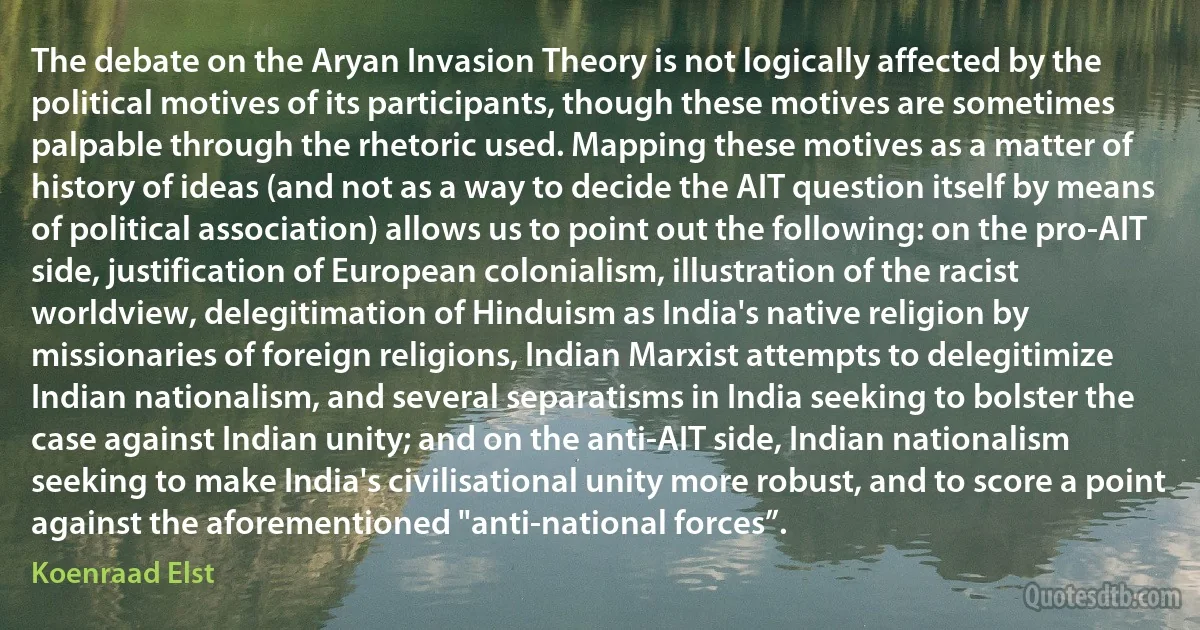
The debate on the Aryan Invasion Theory is not logically affected by the political motives of its participants, though these motives are sometimes palpable through the rhetoric used. Mapping these motives as a matter of history of ideas (and not as a way to decide the AIT question itself by means of political association) allows us to point out the following: on the pro-AIT side, justification of European colonialism, illustration of the racist worldview, delegitimation of Hinduism as India's native religion by missionaries of foreign religions, Indian Marxist attempts to delegitimize Indian nationalism, and several separatisms in India seeking to bolster the case against Indian unity; and on the anti-AIT side, Indian nationalism seeking to make India's civilisational unity more robust, and to score a point against the aforementioned "anti-national forces”.
Koenraad ElstRelated topics
aforementioned ait aryan case debate following foreign hinduism history illustration mapping matter nationalism point question religion rhetoric score seeking side way means marxist racist colonialism worldviewRelated quotes
Islam's money and muscle power may look impressive, certainly capable of doing some real damage to targeted countries and societies, but Islam has no chance of becoming the religion of a science-based, space-conquering world society. Exclusivist revelations have no appeal among educated people, especially after they have acquainted themselves with the Vedantic or Buddhist philosophies. That is why the Churches are investing huge resources in the battle for Asia's mind, where they face their most formidable enemy. That is why they are so active in India: not only is India's atmosphere of religious freedom more hospitable to them than the conditions of Islamic countries, or even of non-Islamic countries where proselytization is prohibited (countries as divergent as China, Myanmar, Israel, and, at least formally, Nepal); but they also know and fear the intrinsic superiority of the Indian religion.

Koenraad Elst
A true scholarship would examine, and then either accept or reject, with good reason, any new theory which challenges a generally accepted theory admitted to be full of sharp anomalies. However, this has not been the attitude of world scholarship towards our earlier book. The general attitude has been as follows: there is a school of crank scholarship in India which is out to prove, by hook or by crook, that India was the original homeland of the Indo-European family of languages; and the writers of this school deserve to be firmly put in their place. And the best method of doing this is by tarring all scholars who support, or even appear to support, an Indian homeland theory, with one brush; and then pointing out particularly untenable propositions made by one or the other of the scholars so branded together, to prove that all the scholars so named belong to one single school of irrational scholarship.

Shrikant Talageri
Today's looting and acts of violence in Baltimore will not be tolerated. In response, I have put the Maryland National Guard on alert so they can be in position to deploy rapidly as needed. I strongly condemn the actions of the offenders who are engaged in direct attacks against innocent civilians, businesses and law enforcement officers. There is a significant difference between protesting and violence and those committing these acts will be prosecuted under the fullest extent of the law.My thoughts and prayers go out to the men and women in uniform who are actively working to stem this violence and several who been injured in the line of duty. These malicious attacks against law enforcement and local communities only betray the cause of peaceful citizens seeking answers and justice following the death of Freddie Gray.

Larry Hogan
When I sat on the Senate Committee on Foreign Relations and listened to American delegations appealing in behalf of kinsman or old home folks across the seas, I caught the aspirations of nationality, and the perfectly natural sympathy among kindred in this republic. But I little realized then how we might rend the concord of American citizenship in our seeking to solve Old World problems. There have come to me, not at all unbecomingly, the expressed anxieties of Americans foreign born who are asking our country's future attitude on territorial awards in the adjustment of peace. They are Americans all, but they have a proper and a natural interest in the fortunes of kinsfolk and native lands. One cannot blame them. If our land is to settle the envies, rivalries, jealousies, and hatreds of all civilization, these adopted sons of the Republic want the settlement favorable to the land from which they came.

Warren G. Harding
We have entered a time of global transition marked by uniquely contradictory trends. Regional and continental associations of States are evolving ways to deepen cooperation and ease some of the contentious characteristics of sovereign and nationalistic rivalries. National boundaries are blurred by advanced communications and global commerce, and by the decisions of States to yield some sovereign prerogatives to larger, common political associations. At the same time, however, fierce new assertions of nationalism and sovereignty spring up, and the cohesion of States is threatened by brutal ethnic, religious, social, cultural or linguistic strife. Social peace is challenged on the one hand by new assertions of discrimination and exclusion and, on the other, by acts of terrorism seeking to undermine evolution and change through democratic means.

Boutros Boutros-Ghali
